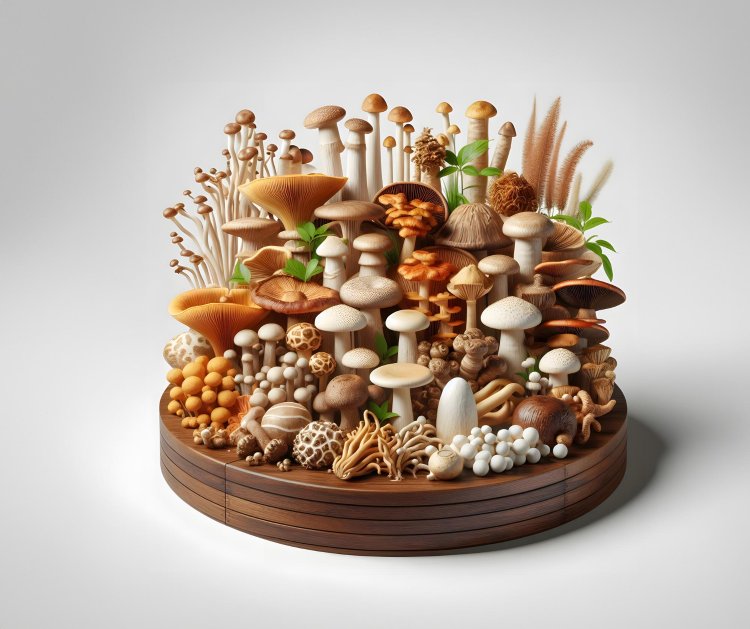Types of Mushrooms
Button Mushrooms (Agaricus bisporus)
Commonly known as white mushrooms when immature and portobellos when mature, these mushrooms are mild in flavor and versatile in cooking. They are rich in B vitamins (riboflavin, niacin, pantothenic acid), minerals (selenium, copper, potassium), and antioxidants. Portobellos, in particular, are prized for their meaty texture and are often used as a vegetarian substitute for meat.
Shiitake Mushrooms (Lentinula edodes)
Originating from East Asia, shiitake mushrooms are renowned for their robust flavor and meaty texture. They contain essential amino acids, B vitamins (especially B2 and B5), minerals (such as copper, zinc, selenium), and polysaccharides like lentinan, which have been studied for their immune-boosting properties. Shiitakes are also a notable source of vitamin D, especially when exposed to sunlight during growth.
Oyster Mushrooms (Pleurotus ostreatus)
Named for their oyster-like appearance, these mushrooms come in various colors and are appreciated for their delicate, mild flavor. They are low in calories but rich in protein, dietary fiber, iron, zinc, potassium, and B vitamins. Oyster mushrooms are versatile in the kitchen, suitable for sautéing, grilling, or adding to soups and stir-fries.
Morel Mushrooms (Morchella spp.)
Highly prized by chefs and foragers alike, morels are distinguished by their distinctive honeycomb appearance and nutty flavor. They are rich in vitamins (especially vitamin D), minerals (such as iron and copper), and antioxidants. Morels are typically found in the wild and are a gourmet delicacy known for their complex taste profile.
Chanterelle Mushrooms (Cantharellus spp.)
Golden-orange in color with a delicate, fruity aroma, chanterelles are popular in European cuisine. They are rich in vitamin C, potassium, and antioxidants. Chanterelles are often foraged in the wild and are prized for their unique taste and culinary versatility.
Health Benefits of Mushrooms
Nutrient Density
Mushrooms are low in calories and carbohydrates but dense in essential nutrients. They provide B vitamins (riboflavin, niacin, pantothenic acid), vitamin D (especially in varieties like shiitake), minerals (selenium, copper, potassium), antioxidants (such as ergothioneine and selenium), and dietary fiber.
Immune Support
Certain mushrooms, like shiitakes and maitakes, contain beta-glucans and polysaccharides that may enhance immune function and help the body defend against infections.
Antioxidant Properties
Mushrooms contain various antioxidants that protect cells from oxidative damage caused by free radicals, potentially reducing the risk of chronic diseases.
Cardiovascular Health
Compounds found in mushrooms, such as eritadenine in shiitakes, may help lower cholesterol levels and support heart health.
Culinary Uses
Mushrooms are incredibly versatile in cooking:
- Sautéed: A popular method to enhance the natural flavors of mushrooms with garlic, butter, or olive oil.
- Grilled or Roasted: Larger mushrooms like portobellos can be grilled or roasted as a meaty main dish or burger substitute.
- In Soups and Stews: Mushrooms add depth and umami to soups, stews, and sauces, enhancing their flavor profiles.
- Stuffed: Portobello mushrooms are commonly stuffed with cheese, vegetables, or breadcrumbs for a satisfying appetizer or entrée.
Safety Considerations
Wild Mushrooms
Exercise caution when foraging wild mushrooms, as some varieties can be toxic and cause severe illness or even death. It's crucial to be knowledgeable about safe identification or consult with an expert before consuming wild mushrooms.
Allergies
While uncommon, some individuals may be allergic to certain types of mushrooms. Symptoms can range from mild to severe, so it's important to be aware of any allergies before incorporating mushrooms into the diet.
In conclusion, mushrooms, with their rich flavors, nutritional richness, and culinary adaptability, continue to intrigue and delight food enthusiasts and health-conscious individuals alike. Whether enjoyed for their immune-boosting properties, gourmet appeal, or culinary versatility, mushrooms stand as a testament to nature's bounty and the art of gastronomy.
Disclaimer: The information provided in this article is for educational purposes only and should not be considered medical advice. If you have any health concerns or are experiencing symptoms, it is important to consult with a healthcare professional, such as a doctor or clinic, for proper diagnosis and treatment. Always seek the advice of your doctor or other qualified health provider with any questions you may have regarding a medical condition. Do not disregard professional medical advice or delay in seeking it because of something you have read in this article.
#Mushrooms #HealthBenefits #CulinaryUses #SafetyConsiderations #Nutrition #ImmuneSupport #Antioxidants #CardiovascularHealth






















